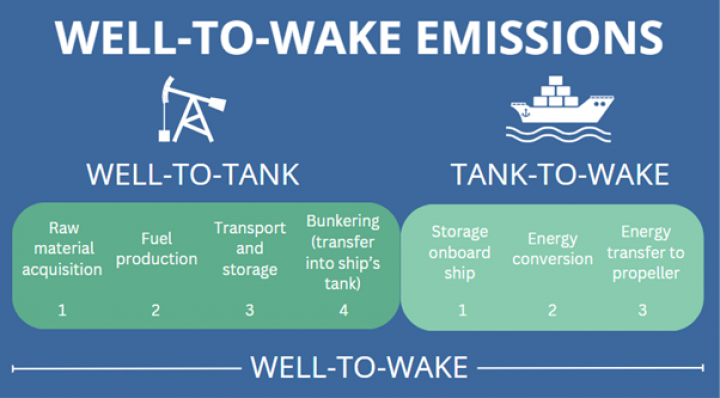Lead agency: International Maritime Organization (IMO).
Overview
The overall aim of Working Group 46 (WG 46) is to provide scientific and technical advice to the Marine Environment Protection Committee (MEPC) related to the implementation of the Guidelines on life cycle GHG intensity of marine fuels (LCA Guidelines). Specifically, WG 46 considers methodological refinement of the emission quantification in the LCA Guidelines, indicators and metrics for sustainability themes/aspects in the LCA Guidelines and methodological requirements of the LCA Guidelines connected to certification. LCA stands for life cycle assessment and determines the potential environmental impacts of products, processes or services from cradle to grave. The LCA Guidelines refer to the assessment of greenhouse gas (GHG) emissions across the full lifespan of a given marine fuel – from primary production through to the end-use by a ship.
Background
Shipping will need new zero or near-zero GHG emission fuels to achieve the levels of ambition of the 2023 IMO Strategy on Reduction of GHG Emissions from Ships. This includes ensuring that zero or near-zero GHG emission technologies, fuels and/or energy sources will represent 5 to 10% of the energy used by international shipping by 2030 and to achieve the 2050 level of ambition – to reach net-zero GHG emissions by or around 2050, taking into account different national circumstances.
To help identify appropriate alternative low- or zero-GHG fuel candidates for shipping, it is necessary to comprehensively assess the levels of GHG emissions involved throughout the life cycle of the fuels, including the earlier stages of their production. This is because candidate low-carbon and zero-carbon fuels for shipping come from a range of production pathways which lead to significant differences in their overall environmental footprint. To identify alternative fuels with the lowest overall footprint requires a standardised method considering the entire life cycle of the fuel what is known as LCA.
The life cycle of a marine fuel can be divided in two main parts for default emission factor calculations (estimations of the amount of pollution emitted by a certain source or activity): well-to-tank (WtT) and tank-to wake (TtW). WtT assessments span from primary sourcing of the fuel until fuel bunkering. These are known as upstream emissions. TtW (also called “tank-to-propeller”) assessments span from the ship’s fuel tanks until its use (fuel combustion/conversion in a ship). These are known as downstream emissions. An LCA combines these two parts to create a holistic well-to-wake (WtW) assessment of GHG emissions for a given fuel.
Main parts in the full life cycle of a marine fuel.
History and work of WG 46
WG 46 was established in April 2024 at the request of the 81st session of the MEPC.
During their 80th session, MEPC adopted the first version of the Guidelines on life cycle GHG intensity of marine fuels (LCA Guidelines), which allowed for a comprehensive well-to-wake (WtW) calculation of total GHG emissions related to the production and use of marine fuels.
During their 81st session, MEPC adopted revised Guidelines on life cycle GHG intensity of marine fuels (2024 LCA Guidelines), which include revised calculations for default emission factors, and updated templates for submission of default well-to-tank (appendix 4) and tank-to-wake (appendix 5) emission factors. During this session, MEPC requested that a GESAMP working group be set up to provide scientific and technical advice on issues related to the implementation of the LCA Guidelines.
Greenhouse gases (GHGs) covered by the current LCA Guidelines are carbon dioxide (CO2), methane (CH4) and nitrous oxide (N2O).
Further information about the IMO’s work on the Guidelines on life cycle GHG intensity of marine fuels (LCA Guidelines) can be found on the IMO website.
The first meeting of the WG 46 was held in-person at IMO Headquarters, from 10 to 13 September 2024, complemented by three virtual sessions (16 October, and 4 and 6 November 2024).
Current and future work of WG 46
WG 46’s submitted the report of its first meeting to MEPC 83 which included a proposed Methodology for submission, scientific review and recommendation of proposed default emission factors. WG 46 identified several areas where more work would be needed including (1) definition of "fuel pathway" and "pathway code"; (2) development of a uniform understanding of "representativeness" and "conservativeness" for the assessment of default emission factors; (3) support to the Secretariat in developing and testing the Excel tool; (4) ILUC risk-based approach; (5) development of flow charts of carbon sources and sinks to avoid double-counting; and (6) recommendations for content and structure of the TtW default emission template (appendix 5 of the LCA Guidelines).
The second meeting of WG 46 is scheduled from 30 June to 4 July 2025 and the third meeting from 3 to 7 November 2025.
Current members of WG 46
Chair: Salma Brynolf (Sweden)
Chang Shengdai (China), Deoras Prabhudharwadkar (India), Farhad Masum (Bangladesh), Hiang Kwee Ho (Singapore), Janie Ling-Chin (Malaysia), Kati Lehtoranta (Finland), Marcelo Moreira (Brazil), Matteo Prussi (Italy), Michael Wang (United States), Patrick Kirchen (Canada), Rachael Rothman (United Kingdom), Ryuji Miyake (Japan).
Page last updated: 16 June 2025
